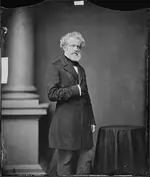http://upload.wikimedia.org/wikiped...C_McCormick.jpg/220px-Richard_C_McCormick.jpg
pay close attention to the shape of McCormick's left hand and where he has his right one in this photo. Compare it to these photos of hands.
View attachment 1032282 View attachment 1032283


I found McCormick, who was the man responsible for the State seal, to be a little suspicious and invoking some familiar response and actions .....he also had interest in the railroad, telegraph and postal contracts which we now know was monopolized by the K.G.C./ O.A.K..
McCormick was a leader in Arizona Territory's
"Federal Ring". This group was a coalition of territorial official and leading citizens that worked in a nonpartisan fashion
to protect the lives and property of the territory's American population,
establish law and order, and
develop Arizona's economic potential. To achieve their goals, the clique crossed traditional political divides of the day, with
Northern Republican governors appointing Southern Democrats and Hispanics to governmental positions. The "Federal Ring"
dominated territorial politics between 1863 and 1877 and, while labeled a self-perpetuating oligarchy by critics, succeeded in providing a territorial government that was
generally free of corruption and dishonesty.(BULL

)
McCormick also pushed for creation of the roads, railroads, telegraph lines, and postal routes needed for such an economy to function. He also asked Congress to
acquire additional land from Mexico so that Arizona could have a port on the Gulf of California.
To help protect the growing population from outlaws, McCormick asked the territorial legislation to
create courthouses and jails.
Unionist was a political label adopted at various times in the United States by opponents of secession. It was used
primarily by Southerners who did not want to affiliate with the Republicans, or wished to win over anti-secession Democrats.
McCormick announced his candidacy for Territorial delegate on March 12, 1868, with the election scheduled for June 3, 1868. During his run, McCormick avoided normal party affiliations and instead
ran as a nonpartisan candidate under the Unionist banner.
The Unionist label first appeared 1850, during the dispute over the Compromise of 1850. Southerners who supported the Compromise (mainly Whigs) adopted the Unionist label to win over pro-Compromise Democrats and defeat anti-Compromise Democrats. By 1860, the Whig Party was defunct. A group of former Whigs formed the Constitutional Union Party, with
John Bell as candidate for President. During his 1860 presidential campaign, Bell argued that secession was unnecessary since the
Constitution protected slavery, an argument which resonated with voters in border states, helping him capture the electoral votes of Tennessee, Kentucky and Virginia. After the Battle of Fort Sumter in April 1861,
Bell abandoned the Union cause and supported the Confederacy. In Missouri, after Federal troops expelled pro-secession Governor Claiborne Jackson, the state legislature chose a new "Unionist" governor. "Unionist" candidates won state elections in Kentucky and Maryland. In Virginia, state legislators from western Virginia declared secession void, and chose a "Unionist" government; they subsequently elected "Unionist" U.S. Senators as well. When the state of West Virginia was created in 1863, its officeholders were elected as "Unionists".
The 1868 election centered on the issue of the territorial capital of Arizona having been moved the prior year, with allegations circulated that McCormick had been promised support from Pima County if he signed the bill. McCormick only won a single county during the election, Pima, but the margin was sufficient for him to be elected Territorial Delegate. This sounds familiar to Nebraska State Capitol issues after Omaha was named the Capitol City instead of Nebraska City which was the original K.G.C. Plan.....
During his first term, McCormick's efforts were focused on the Apache Wars and establishment of additional postal routes within Arizona.
Any political struggles related to postal, telegraph or railroad related government contracts, is highly suspicious during those years.... I find him highly suspect, and now I am even more curious about that State Seal.......

Just my 2 cents, L.C.
 or maybe
or maybe
 2. while faxing is easy no reason not to send 2.
2. while faxing is easy no reason not to send 2.




 )
)
 .......I had to Google it! Thanks Nobody, my vocabulary just increased by one!!!
.......I had to Google it! Thanks Nobody, my vocabulary just increased by one!!!
